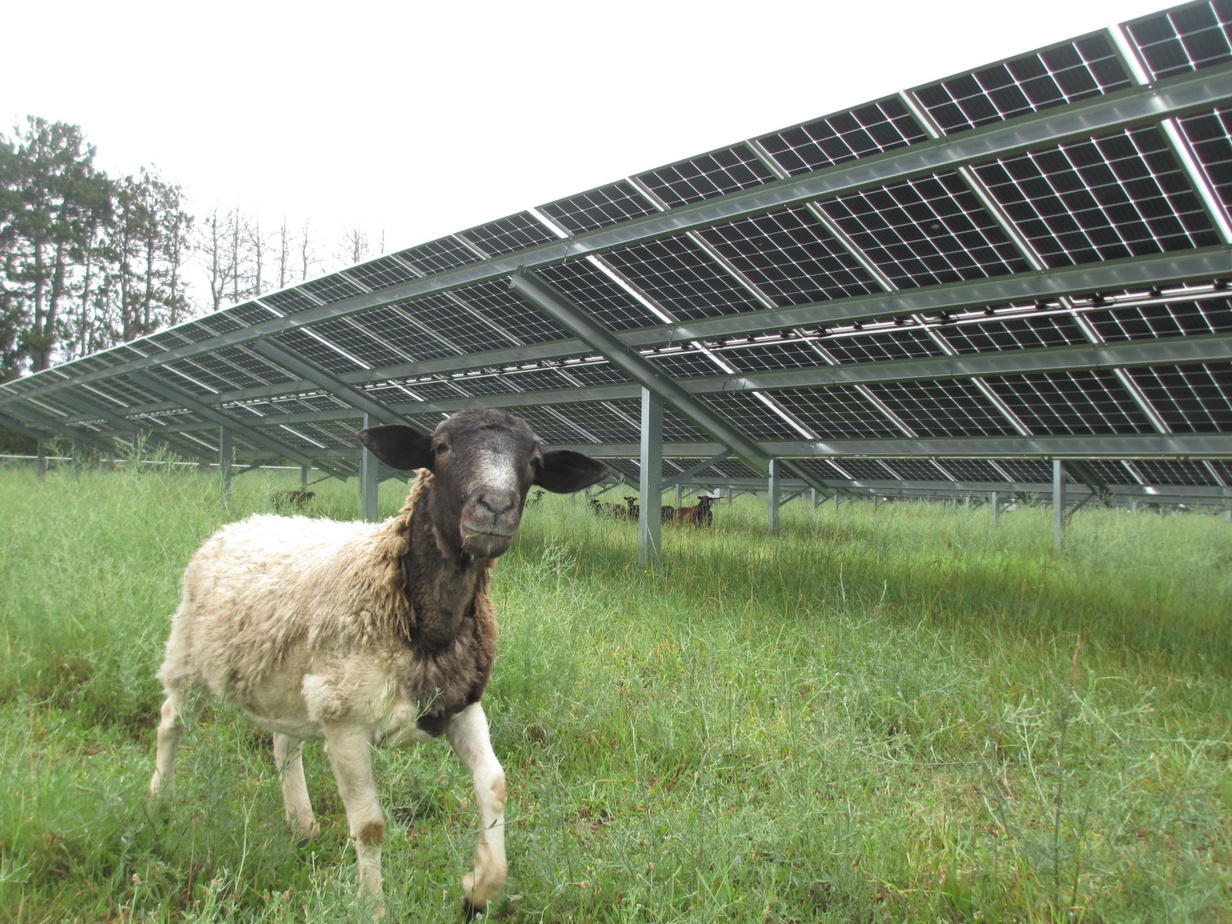
Sheep & Solar Panels: The Solution For Struggling Local Farms?
By Craig Manning | Sept. 17, 2025
If you look closely next time you drive by the Heritage Sustainable Energy solar farm off M-72, you might notice an unexpected sight: a flock of sheep gobbling up the grass. And they aren’t there by accident. For several years, Heritage has contracted with a local sheep farmer to ensure that plants aren’t getting overgrown and blocking sunlight from reaching the solar panels. It’s an example of a new trend called “agrivoltaics,” which both the Groundwork Center for Resilient Communities and the Michigan State University Extension see as a potential gamechanger for Michigan’s embattled agricultural industry.
“I've worked with Michigan farmers for over 30 years, and when I sit across the table from a farmer who's struggling, I’m always looking for ways to help them bring extra revenue to the farm,” says Charles Gould, a bioenergy educator with MSU Extension. “That’s the situation we have on a lot of Michigan farms right now: We have low commodity prices, and we have farmers that that are struggling to pay off debt. But we also have an opportunity here with renewable energy – and with solar in particular – to help our farms bring in the revenue that's necessary to keep them going.”
Gould is talking about agrivoltaics, or “agriculture co-location,” defined by the United States Department of Energy as “agricultural production, such as crop or livestock production or pollinator habitats, underneath solar panels or adjacent to solar panels.” The concept is about forging mutually beneficial relationships between farmers and solar developers or utilities. At the M-72 solar farm, Heritage Sustainable Energy has a contract with local sheep farmer Brenden Ritola, who regularly brings a flock of sheep to the site for vegetation management.
“The shading of solar panels equals lost revenue for solar developers, because electricity is not being produced," Gould says. The solar companies have to pay someone to manage vegetation anyway, so the question becomes: Do we want to hire a landscaper who is going to bring in lawnmowers and have the pollution from those engines going up into the air, or do we want to bring in a shepherd and their sheep to deal with the issue? To me, it’s a no-brainer.”
When Lyla Hollis came aboard at Groundwork Center a few months ago as the organization’s new clean energy specialist, she took some time “meeting with different farmers and solar developers in Traverse City,” and was immediately taken with what was going on at the Heritage site.
“I had a meeting with the project manager over there, and I noticed the sheep grazing underneath the solar panels,” she tells The Ticker. “It was fun seeing them in action, having not even realized that they’ve been doing this for years, and it’s honestly kind of shocking the amount of people who drive by that solar farm every day and don’t know about the sheep. I decided I really wanted to highlight that, both as a diversified income stream for local farmers and as a way to combat the false narrative that farmland is being taken over by solar.”
In hopes of spreading the word about agrivoltaics and its potential for local farmers, Hollis and the Groundwork team organized an open house at the Heritage solar site, scheduled from 10am-1pm on Saturday, October 4. The event will let attendees “experience sheep grazing on hard-to-remove invasive species,” and will also see Groundwork planting native pollinator species as another example of agrivoltaics. The session will culminate with an agrivoltaics panel discussion featuring Ritola; Bart Hautala, operations manager for the Heritage site; Daniel Marbury, program specialist for Crosshatch Center for Art & Ecology; and Brandie Ekren, executive director for Traverse City Light and Power. The event is free and public, but those interested in attending are asked to register ahead of time.
Gould says this type of agrivoltaics – using sheep for vegetation management – is the most common version of the trend in Michigan. “There’s a shepherd who has grazed a 156-acre solar site in Wexford County and a 179-acre site in Calhoun County, and he now has about 1,100 sheep,” Gould notes. “When I visited him in December, he had 200 sheep. Then he expanded his flock to 500 so he could meet the demands of keeping the vegetation under control, and now he's up to 1100. He has even revised his business plan for his farm to focus on solar grazing. So, he’s diversified his income very quickly.”
But there are other variations out there, too, and they don’t all involve taking livestock off the farm and bringing them to existing solar sites. Both Hollis and Gould are interested in seeing more partnerships between farmers and utilities that would bring solar panels to farmland, right alongside crops.
“For that to happen, you’d want the solar developer and the farmer to sit down at the very beginning of the project and plan everything out together,” Gould notes. “But theoretically, there are a ton of crops that we grow here in Michigan that would do just fine co-located with a solar project. The Michigan Tree Fruit Commission has even funded a project in Oceana County where they are looking at growing fruit trees under solar.”
With the proper design, Gould says, such a setup could even protect fruit trees from some extreme weather conditions, helping prevent sun scald on apples and heavy rain or hail on cherry trees – problems that have plagued local farmers in recent years.
Photo credit: Lyla Hollis
Comment






